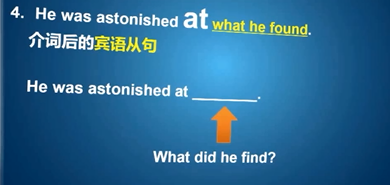文章目录
- 1 课文
- 2 单词
- 2.1 unload [ˌʌnˈləʊd] v. 卸(货)
- 2.2 wooden [ˈwʊdn] adj. 木制的
- 2.3 extremely [ɪkˈstri:mli] adv. 非常,极其
- 2.4 occur [əˈkɜ:(r)] v. 发生
- 2.5 astonish [əˈstɒnɪʃ] v. 使惊讶
- 2.6 pile [paɪl] n. 堆
- 2.7 woollen ['wʊlən] adj. 羊毛的
- 2.8 goods [gʊdz] n. (常用复数)货物,商品
- 2.9 discover [dɪˈskʌvə(r)] v. 发现
- 2.10 admit [ədˈmɪt] v. 承认
- 2.11 confine [kənˈfaɪn] v. 关在(一个狭小的空间里)
- 2.12 normal [ˈnɔ:ml] adj. 正常的,通常的
- 3 同位语从句
- 4 doing/being done
1 课文
What did the man in this story do?
When a plane from London arrived at Sydney airport, workers began to unload a number of wooden boxes which contained clothing.
【1 when 时间状语从句,2 which 定语从句 3 a number of + 可数名词复数】
No one could account for the fact that one of the boxes was extremely heavy.
【1 account for 解释说明】
It suddenly occurred to one of the workers to open up the box.
【It occurred to sb to do sth.某人突然想去做某事】
He was astonished at what he found.
【介词后面的宾语从句

】
A man was lying in the box on top of a pile of woolen goods.
He was so surprised at being discovered that he did not even try to run away.
【so … that… 太…所以…结果状语从句】
After he was arrested, the man admitted hiding in the box before the plane left London.
【admit doing 承认做了某事】
He had had a long and uncomfortable trip, for he had been confined to the wooden box for over eighteen hours.
【1 had had :have 的过去完成时;2 for + 句子:表示因为。不能放到句首。3 be confined to 被困在。4 for + 时间段:表示持续了多久】
The man was ordered to pay $3,500 for the cost of the trip.
【for + 名词:表示目的。】
The normal price of a ticket is $2,000!
参考译文
当一架来自伦敦的飞机抵达悉尼机场时,工人们开始卸下装有服装的一批木箱。其中有只箱子特别重,可谁也弄不清是怎么回事。突然一个工人想到打开箱子看看。 看到的情景使人吃惊,箱内有一个人正躺在一堆毛织品之上。他由于被人发现而感到非常吃惊,甚至都没有企图逃跑。此人被逮捕后,承认他是在飞机离开伦敦前躲 进箱里的。他经历了一次漫长而又难受的旅程,因为他在那木箱里闷了18个多小时。此人被责令交付旅费3,500英镑,而正常票价是2,000英镑!
2 单词
2.1 unload [ˌʌnˈləʊd] v. 卸(货)
unload boxes 卸货
unload passengers 下人
load v. 装(货),放入
download / upload
2.2 wooden [ˈwʊdn] adj. 木制的
wood 木头
2.3 extremely [ɪkˈstri:mli] adv. 非常,极其
突破极限
2.4 occur [əˈkɜ:®] v. 发生
occur occurred occured
sth. occur to sb. 某人(突然)想起某事
A good idea occurred to me. = I suddenly got a good idea.
我突然想起来给我妈妈打个电话。
To do sth occur to sb = it occurs/occured to sb to do sth.(it做形式主语)
It occurs to me to call my mom
It occurs/occurred to sb to do sth. 某人突然想去做某事
It suddenly occurred to one of the workers to open up the box
2.5 astonish [əˈstɒnɪʃ] v. 使惊讶
be astonished at …惊讶于某件事
be surprised at …
2.6 pile [paɪl] n. 堆
a pile of money 一堆钱
2.7 woollen ['wʊlən] adj. 羊毛的
wool n.羊毛
2.8 goods [gʊdz] n. (常用复数)货物,商品
2.9 discover [dɪˈskʌvə®] v. 发现
2.10 admit [ədˈmɪt] v. 承认
I’m wrong, and I admit it. admit doing sth.
The man admitted hiding in the box.
2.11 confine [kənˈfaɪn] v. 关在(一个狭小的空间里)
be confined to 被关在
2.12 normal [ˈnɔ:ml] adj. 正常的,通常的
abnormal 不寻常的,反常的
normally 正常地
3 同位语从句
3.1 含义
一个句子做同位语,解释说明前面的名词
3.2 位置:
所解释的抽象名词后,如fact,news,theory,idea,suggestion,report
3.3 写法
同宾语从句。最常用的结构是 that + 完整的陈述句。that不做成分,也不能省略。
名词性从句:主,宾,表,同位语。(4种属于同于一类,名词从句)
e.g
我从不怀疑他将会帮助我.
I have no doubt that he will help me.
我支持这种观点,校车问题必须被严肃对待
I support the argument that the problems of school uses must be taken seriously.
3.4 定语从句和同位语从句

相同的:都跟在名词后
不同点:
1 同位语是解释说明前面的名词的。和名词是一回事。
2 定语是修饰前面的名词的。要翻译成为"…的…"
如何分辨:
方式1:名词加从句。关系被省略,一定是定语从句。
方式2:同位语从句,只能跟在抽象名词后。
方式3:看连接词在句子做不做成分。同位语连接词不做成分。定语从句,连接词做成分。
4 doing/being done
He was so surprised as discovering…惊讶于主动发现
He was so surprised as discovering…惊讶于被发现
puzz:困惑
I was puzzed at being invited to the stranger’s wedding.
She was amoused at talking with her new friend.
他很高兴被提升成为高级经理。
He was delighted at being promoted to senior manager.